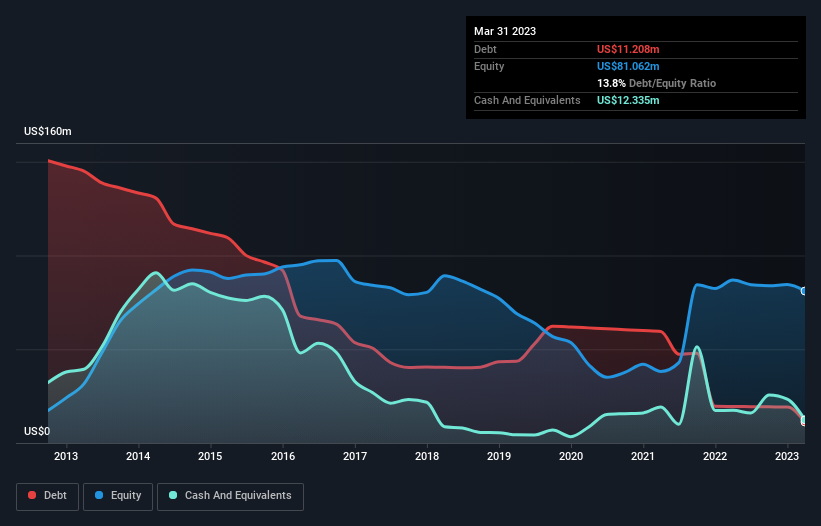- United States
- /
- Healthcare Services
- /
- NasdaqGS:PHLT
Is Performant Financial (NASDAQ:PFMT) Using Too Much Debt?
The external fund manager backed by Berkshire Hathaway's Charlie Munger, Li Lu, makes no bones about it when he says 'The biggest investment risk is not the volatility of prices, but whether you will suffer a permanent loss of capital.' So it might be obvious that you need to consider debt, when you think about how risky any given stock is, because too much debt can sink a company. Importantly, Performant Financial Corporation (NASDAQ:PFMT) does carry debt. But should shareholders be worried about its use of debt?
What Risk Does Debt Bring?
Debt and other liabilities become risky for a business when it cannot easily fulfill those obligations, either with free cash flow or by raising capital at an attractive price. Part and parcel of capitalism is the process of 'creative destruction' where failed businesses are mercilessly liquidated by their bankers. However, a more usual (but still expensive) situation is where a company must dilute shareholders at a cheap share price simply to get debt under control. By replacing dilution, though, debt can be an extremely good tool for businesses that need capital to invest in growth at high rates of return. The first thing to do when considering how much debt a business uses is to look at its cash and debt together.
View our latest analysis for Performant Financial
What Is Performant Financial's Net Debt?
You can click the graphic below for the historical numbers, but it shows that Performant Financial had US$11.2m of debt in March 2023, down from US$19.5m, one year before. But it also has US$12.3m in cash to offset that, meaning it has US$1.13m net cash.

How Strong Is Performant Financial's Balance Sheet?
We can see from the most recent balance sheet that Performant Financial had liabilities of US$11.5m falling due within a year, and liabilities of US$11.1m due beyond that. Offsetting these obligations, it had cash of US$12.3m as well as receivables valued at US$27.7m due within 12 months. So it actually has US$17.5m more liquid assets than total liabilities.
This surplus suggests that Performant Financial has a conservative balance sheet, and could probably eliminate its debt without much difficulty. Succinctly put, Performant Financial boasts net cash, so it's fair to say it does not have a heavy debt load! The balance sheet is clearly the area to focus on when you are analysing debt. But ultimately the future profitability of the business will decide if Performant Financial can strengthen its balance sheet over time. So if you want to see what the professionals think, you might find this free report on analyst profit forecasts to be interesting.
Over 12 months, Performant Financial made a loss at the EBIT level, and saw its revenue drop to US$108m, which is a fall of 10%. We would much prefer see growth.
So How Risky Is Performant Financial?
Statistically speaking companies that lose money are riskier than those that make money. And we do note that Performant Financial had an earnings before interest and tax (EBIT) loss, over the last year. Indeed, in that time it burnt through US$4.2m of cash and made a loss of US$9.1m. With only US$1.13m on the balance sheet, it would appear that its going to need to raise capital again soon. Overall, its balance sheet doesn't seem overly risky, at the moment, but we're always cautious until we see the positive free cash flow. The balance sheet is clearly the area to focus on when you are analysing debt. However, not all investment risk resides within the balance sheet - far from it. These risks can be hard to spot. Every company has them, and we've spotted 3 warning signs for Performant Financial you should know about.
At the end of the day, it's often better to focus on companies that are free from net debt. You can access our special list of such companies (all with a track record of profit growth). It's free.
New: Manage All Your Stock Portfolios in One Place
We've created the ultimate portfolio companion for stock investors, and it's free.
• Connect an unlimited number of Portfolios and see your total in one currency
• Be alerted to new Warning Signs or Risks via email or mobile
• Track the Fair Value of your stocks
Have feedback on this article? Concerned about the content? Get in touch with us directly. Alternatively, email editorial-team (at) simplywallst.com.
This article by Simply Wall St is general in nature. We provide commentary based on historical data and analyst forecasts only using an unbiased methodology and our articles are not intended to be financial advice. It does not constitute a recommendation to buy or sell any stock, and does not take account of your objectives, or your financial situation. We aim to bring you long-term focused analysis driven by fundamental data. Note that our analysis may not factor in the latest price-sensitive company announcements or qualitative material. Simply Wall St has no position in any stocks mentioned.
About NasdaqGS:PHLT
Performant Healthcare
Provides audit, recovery, and analytics services in the United States.
Excellent balance sheet with moderate growth potential.
Similar Companies
Market Insights
Community Narratives



